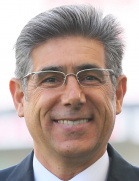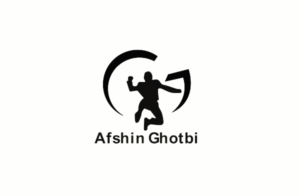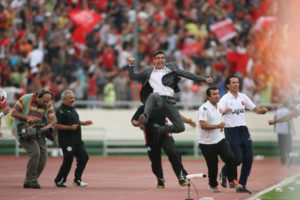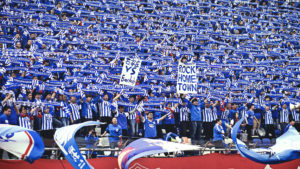Afshin Ghotbi (photo) is considered as an innovative, but also widely traveled coach. The 54 year old has already worked in seven different countries. Whether South Korea, Japan or Iran: everywhere he could leave traces. His work was also noticed by some German clubs and he was about to have another challenge in Germany.
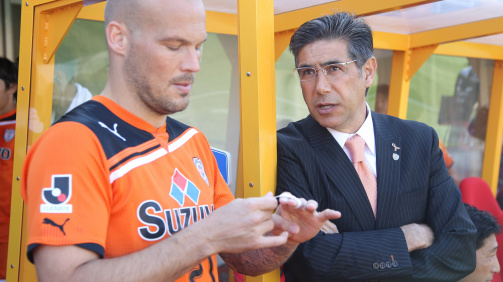
Afshin Ghotbi must be a special coach, you could see the reaction of the fans and players of the Chinese second division Shijiazhuang Ever Bright. After his departure in early September, they stood partly with tears in eyes and supported their coach for the last time.
Q: At your last club in China, players and fans wept after you left. Have you ever experienced something like this?
A: I prefer fans cheering and happy, not crying (smile). On a serious note, I have a very deep passion for football. I bring that deep love to my job every day, and I believe that feeling resonance with the players and fans. Per your question, I have experienced that in every position in my football career. Good byes are always hard.
Q: You worked as trainers in some countries. What prompted you to go abroad and not stay in the US?
A: Football is a global game, and I have always been a global citizen. Working abroad and experiencing living in different parts of the world has always intrigued me. I worked in 7 countries in my career, as I enjoy the sporting, social and cultural challenges. Each country represent different sets of challenges and opportunities for growth. Football connects people, and I have been able to inspire, educate and make people happy through my work. I feel fortunate to have this platform.
Q: Why did you want to become a coach? What is the appeal of your work?
A: I played football since I could walk, and I always enjoyed telling people what to do (smile). I found my calling in life early, as I started my coaching career by working with youth players. I found it very rewarding to be part of the development of a human life. Football provides a unique platform to offer life lessons to young people. Later in professional and international football, I recognized my work can have not only sporting impact, but social, cultural and economical ones. Uniting communities and nations, raising confidence and national pride to an entire country, inspiring creativity and awareness about social issues are few of many fruits of my labor.
Q: You were not a professional football player, a disadvantage in the coaching profession?
A: We were the lost generation in the USA, as we fell between the NASL and MLS period ( the professional leagues in USA at different periods). I played at the highest level possible in the USA during my generation, but we could not make enough money playing football after I graduated from UCLA (my university). So, I continued my playing career while I coached youth players to support my family. In my humble opinion, players without the big playing career will make better coaches. Their lack of fame and relationships will force them to have a more humble beginning, their performance will be under constant scrutiny by media and fans, and they will have to work harder to build their careers… Therefore, it will be big disadvantage to develop a successful coaching career without a distinguished playing career. But, it is possible!
Q: You were assistant coach under some great coaches. What did you learn most from which coach?
A: I have been lucky to work with some of the best coaches in the world, and I have learned from each and everyone one of them different skills. No course, book, video can equate the actual day-to-day life as a coach in a professional club or national football team. Every manager has their own strength and priorities. Some are great tactician or trainers, some are great people managers & motivators, and some are masters with the media. All of them had to be winner to become successful managers. Professional football is all about results, and the results are the byproduct of your attention to details on and off the field. At the end, I have developed my own unique ideology and working method to be a successful modern football manager.

Q: How has the coaching job changed in recent years?
A: The game has rapidly changed in recent years. The demands on the players continue to grow on and off the field. Coaches are forced to manage more complex challenges daily on and off the field. Fixture congestion, media and social media growing influence, sports agents growing power in each club, technological application, and players evolving priorities are some but not only management challenges coaches face in the modern game.
Q: You were born in Iran, but grew up in the United States. Do you feel more than Iranians or more than Americans? Did you have to invest more time and work than other people ?
A: I am proud of my heritage, history and past. They have helped me develop a diverse cultural understanding and tolerance. By having a non-traditional football background, I have had to be prove myself each and everyday making me a better man and manger.

Q: You are innovative in terms of training control and training planning. What is special about your training?
A: I believe the game is the best teacher, so I have developed exercises utilizing all components of the game. Functional, economical, dynamic, explosive and exciting are some words that can describe my methodology. Challenging players to take decisions under pressure, to execute technical speed with precision, and emphasis on tactical organization are important in developing players individually and collectively. Using technology to monitor the physical load, using drones and cameras to get the best images from each training, and creating competition in each exercise will improve players and teams.
Q: How would you describe yourself as a coach? What does the perfect coach look like? Where do you get new ideas and suggestions from?
A: I describe myself as a personable, passionate, energetic, humble and open minded coach… Football is my religion, the club is my home, and players are my family. There is no perfect coach, but perfection will challenge us to be better with each passing day. New ideas are all around us. We can learn from every-one, the key is to keep an open heart and mind.
Q: What do you expect from your players?
A: Everything! I give them my all, and I expect from them their all.
Q: You have worked with different players from different cultures? There are differences in training. Is there something that connects the players?
A: Regardless of geography, players have many similarities. Successful players are intelligent everywhere motivated by money, fame and off days. Most of them have realized winning and success bring them closer to their wishes and dreams. Obviously there are cultural difference and challenges, and the key for me is to tailor my training and method to utilize the strength of my players.
Q: You have spoken as a coach with Hannover 96, Fortuna Dusseldorf and Preußen Münster. Is that correct? How disappointed are you that it did not work and that Germany is your big goal?
A: Yes! I was very disappointed that it did not work out, but I believe it has more to do with not being German than my quality as a trainer. I have been interested in German football all my life. As a young boy, I would stay up late in the evening to watch Bundesliga matches live. As a 10 year old boy, I was in Germany during the World Cup 1974. It is one of my life dreams to work in German football.
Q: Would you also be willing to learn the German language to get a chance in Germany?
A: Of Course!
Q: Why is it difficult for foreign head coaches to get a job in Germany?
A: That is a question for the Sports Director and Presidents of German clubs. I believe having trainers with different back ground will actually make the German League more interesting and attractive. EPL is a good example.
Q: What targets do you generally have as a coach?
A: It is always about Winning and trophies!
Q: What were your biggest achievements for you?
A: That is a difficult question to answer, as I have had success at every level at various scales. Winning at the youth, professional and international level, developing international players with success on global stage and winning trophies with incredibly challenging circumstance are all achievements I will cherish in my career. Obviously, finishing fourth with South Korea at the World Cup 2002, winning MLS and US Cup with the LA Galaxy, and winning the IPL trophy with Persepolis, playing with the youngest selection in the history of the J-League and getting results ranks on top of my achievements.
Q: Many coaches do not use Facebook or Instagram. You are very active in the networks. Why?
A: My goal has been to bring fans closer to my team and give the fans accurate and unfiltered narrative of my work.


